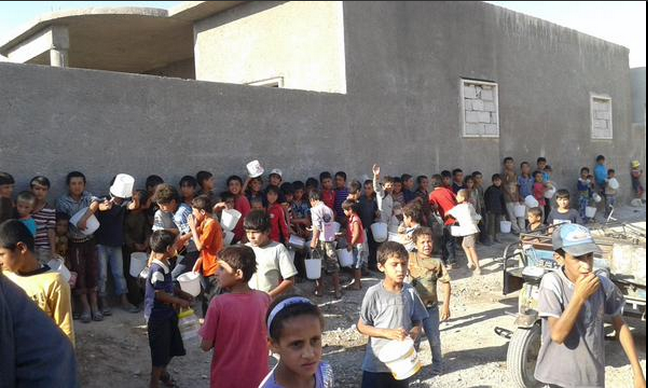Civilians In ISIS 'Capital' Raqqa Trapped Between ISIS Brutality And Syrian Kurdish Fighters' Advances

Abu Mohammed knew he had to get his family out of Raqqa as soon as he heard the news. Militants in the Islamic State group’s de facto headquarters beat and tortured with electric shocks one of his fellow Syrian activists’ 49-year-old father, for 77 days. Then they executed him in one of their prisons on Monday. And that was happening just as Syrian Kurdish fighters, who have a history of alleged atrocities against Arabs, were closing in on Raqqa. If they reached the militants’ “capital,” then Mohammed’s mother, father and brothers were in danger not only at the hands of the Islamic State group or ISIS, but also from the militias fighting it.
“I'm looking for some way to get them out. Every day ISIS arrests some young people and the families are scared,” said Mohammed, an activist with the anti-ISIS monitoring group Raqqa Is Being Slaughtered Silently, who uses a pseudonym for security reasons. “ISIS has spies everywhere,” he said -- and is also arresting people trying to run away.
Mohammed’s family was just one of hundreds looking for a way out of Raqqa before a rapidly approaching battle begins between ISIS and the Syrian Kurdish People’s Protection Units, or YPG. Civilians in Raqqa have lived under brutal ISIS rule for more than a year, but now they also fear the incoming Kurdish fighters.
“They don’t like ISIS and they don’t like YPG,” said Abu Ibrahim al-Raqqawi, a spokesman for the group, who is based outside Syria and also uses an assumed name for safety. “If the battles will be close to Raqqa, I think most of the people will leave and go to another place.”
Al-Raqqawi’s family still lives in Raqqa. So does the family of Hamoud Moussa, another member of the group. Moussa’s father is the man ISIS executed last week. ISIS accused the father of communicating with Moussa, a violation of ISIS rules as Moussa is a known opponent.
All three activists from the group who spoke to International Business Times said their families will try to run from Raqqa if the YPG reaches the city, but fleeing will not be easy. A taxi from Raqqa to the Turkish border can now cost up to 50,000 Syrian pounds, roughly $265.
Their families fear that the YPG “will kill people and burn the houses,” al-Raqqawi said.
Kurdish fighters have seen some of their greatest successes recently, with the help of airstrikes by a U.S.-led coalition, of all the Syrian and Iraqi militias fighting ISIS, and have managed to take some territory in Syria’s northeast. (ISIS remains well entrenched elsewhere, including in the biggest city it holds, Mosul, in the north of Iraq.) However, as in Raqqa, many civilians there feared the YPG fighters. Last week, the YPG pushed ISIS militants out of the town of Tal Abyad, cutting off a key supply route from Turkey to Raqqa. The YPG’s advances in Tal Abyad forced thousands of civilians to flee the city and attempt to cross the border into Turkey.
Earlier this week, Kurdish fighters seized an important military base known as Liwa 93 or “Brigade 93” from ISIS, just 30 miles (50 km) from the ISIS “capital.” By Thursday, ISIS militants reportedly began preparations to defend Raqqa and arrested any civilians caught attempting to flee.
Militants had "begun digging trenches in the vicinity of Raqqa to improve their defences,” YPG spokesman Redur Xelil told Reuters.
ISIS is mobilizing the population of Raqqa for what it sees as a decisive battle, hoping to capitalize on civilian fear and on pre-existing tensions between Arabs and Kurds. Militants have been using daily prayers and public sermons to warn civilians that the Kurds would slaughter Arab civilians, not just the militants, if they reached Raqqa. This could result in additional recruits and assistance in defending the city.
“Every day and every prayer, ISIS says that the Kurds will kill all the Arabs everywhere,” Mohammed said. “ISIS says people should help the Islamic State to stand against secular attack.”
The Kurds are a people dispersed across Iraq, Syria, Turkey and Iran who have never had their own independent state. They have a history of conflict with both the Arabs and the Turks.
Earlier this year in Iraq, for example, Iraqi Kurdish forces denied thousands of Iraqi Arabs access to their homes after ISIS was pushed out of their cities. In Syria, several reports from media outlets and local residents accused Kurdish forces of “ethnic cleansing” of Arabs in the northern provinces. The YPG denied this claim.
“For me and the people of Raqqa, YPG is equal to ISIS,” al-Raqqawi said. “The two are bad. We don’t like them.”
© Copyright IBTimes 2024. All rights reserved.






















